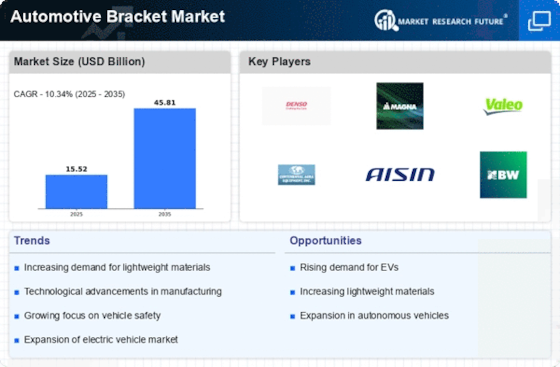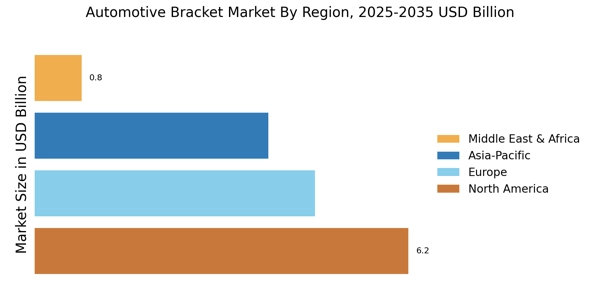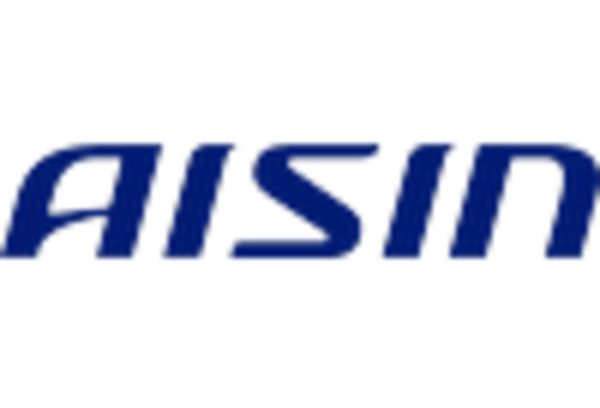Growth of the Electric Vehicle Segment
The growth of the electric vehicle segment is poised to reshape the Automotive Bracket Market. As the automotive landscape shifts towards electrification, the demand for components that support electric drivetrains is increasing. Electric vehicles often require specialized brackets to accommodate battery packs, electric motors, and other unique components. This shift is underscored by the fact that electric vehicle sales are projected to account for a significant portion of total vehicle sales in the coming years. Consequently, manufacturers in the Automotive Bracket Market must adapt their product offerings to meet the specific requirements of electric vehicles, potentially leading to new opportunities for innovation and growth.
Rising Consumer Preference for Customization
Rising consumer preference for customization is influencing the Automotive Bracket Market in profound ways. As consumers seek to personalize their vehicles, manufacturers are responding by offering a wider range of customizable options. This trend extends to automotive brackets, which can be tailored to fit specific vehicle models or consumer preferences. The ability to provide bespoke solutions not only enhances customer satisfaction but also drives sales. Market data indicates that the customization segment is expected to grow at a rate of 10% annually, reflecting the increasing importance of personalized automotive solutions. As a result, the Automotive Bracket Market is likely to see a surge in demand for brackets that can be easily modified or adapted to meet diverse consumer needs.
Increasing Demand for Vehicle Safety Features
The Automotive Bracket Market is experiencing a notable surge in demand for enhanced vehicle safety features. As consumers become more safety-conscious, manufacturers are compelled to integrate advanced safety systems into their vehicles. This trend is reflected in the growing adoption of safety technologies such as airbags, anti-lock braking systems, and electronic stability control. Consequently, automotive brackets, which play a crucial role in securing these components, are witnessing increased demand. According to industry reports, the market for automotive safety systems is projected to grow at a compound annual growth rate of approximately 8% over the next five years. This growth directly influences the Automotive Bracket Market, as the need for reliable and durable brackets becomes paramount to ensure the effectiveness of safety features.
Technological Advancements in Manufacturing Processes
Technological advancements in manufacturing processes are significantly impacting the Automotive Bracket Market. Innovations such as 3D printing, automation, and advanced materials are revolutionizing how automotive brackets are produced. These technologies enable manufacturers to create more complex designs with improved precision and reduced lead times. For instance, the adoption of 3D printing allows for rapid prototyping and customization, which is increasingly important in a market that values personalization. Furthermore, the integration of automation in production lines enhances efficiency and reduces labor costs. As a result, the Automotive Bracket Market is likely to benefit from lower production costs and improved product quality, fostering a competitive edge among manufacturers.
Sustainability Initiatives in Automotive Manufacturing
Sustainability initiatives in automotive manufacturing are becoming increasingly prominent, impacting the Automotive Bracket Market. As environmental concerns rise, manufacturers are under pressure to adopt sustainable practices, including the use of eco-friendly materials and processes. This shift is evident in the growing interest in recyclable materials for automotive components, including brackets. Companies are exploring options such as bio-based plastics and lightweight metals that reduce the overall environmental footprint. Furthermore, regulatory frameworks are evolving to support sustainability, which may drive manufacturers to innovate in their bracket designs. The Automotive Bracket Market is likely to benefit from these initiatives, as sustainable practices not only appeal to environmentally conscious consumers but also align with the broader industry trend towards greener manufacturing.

















